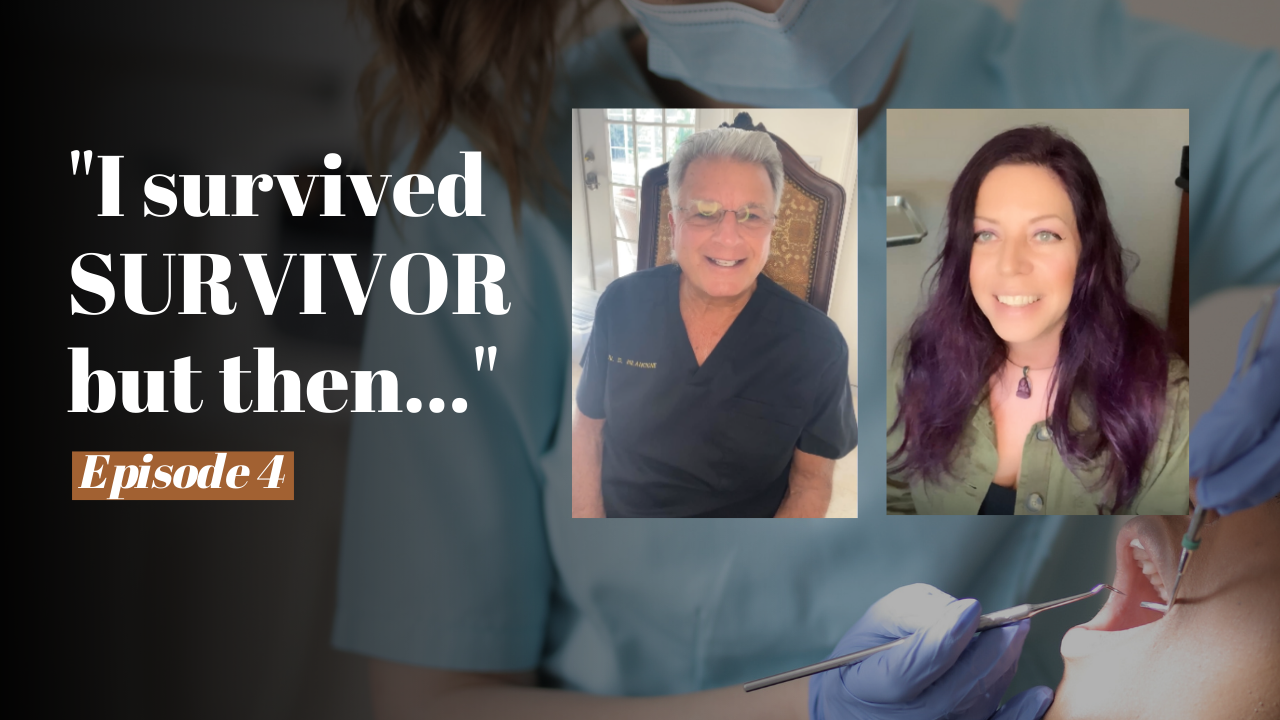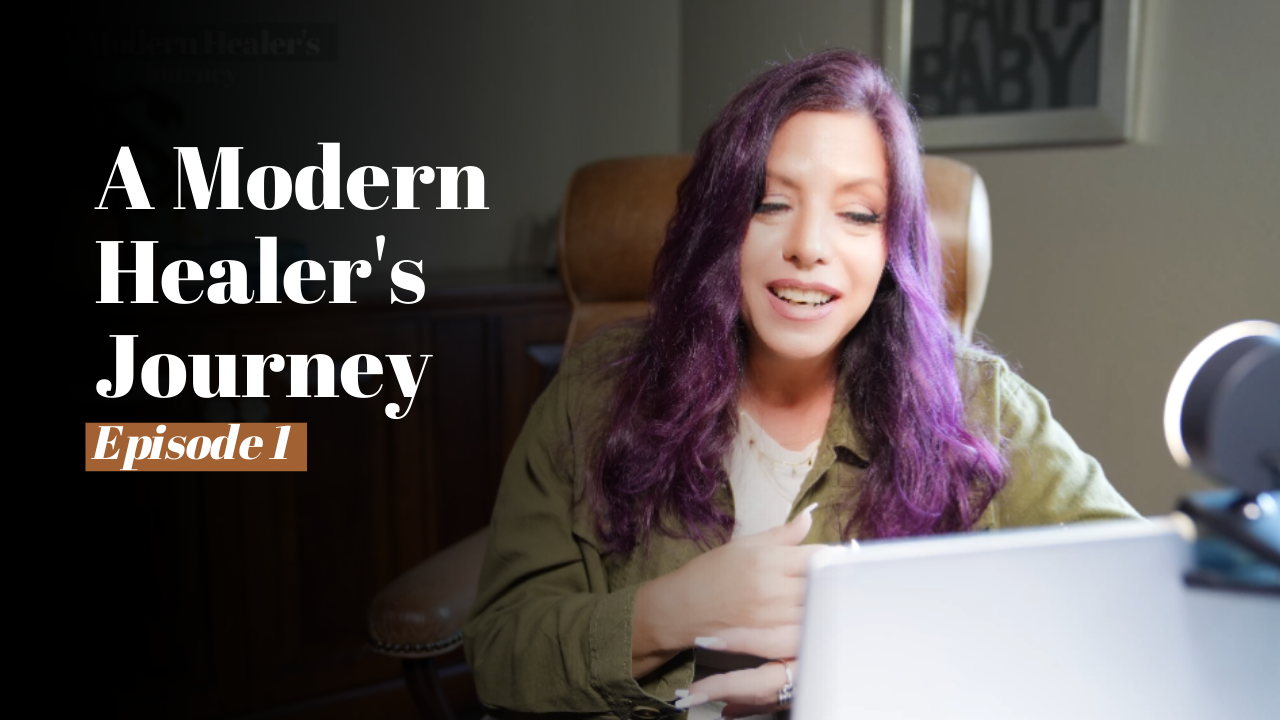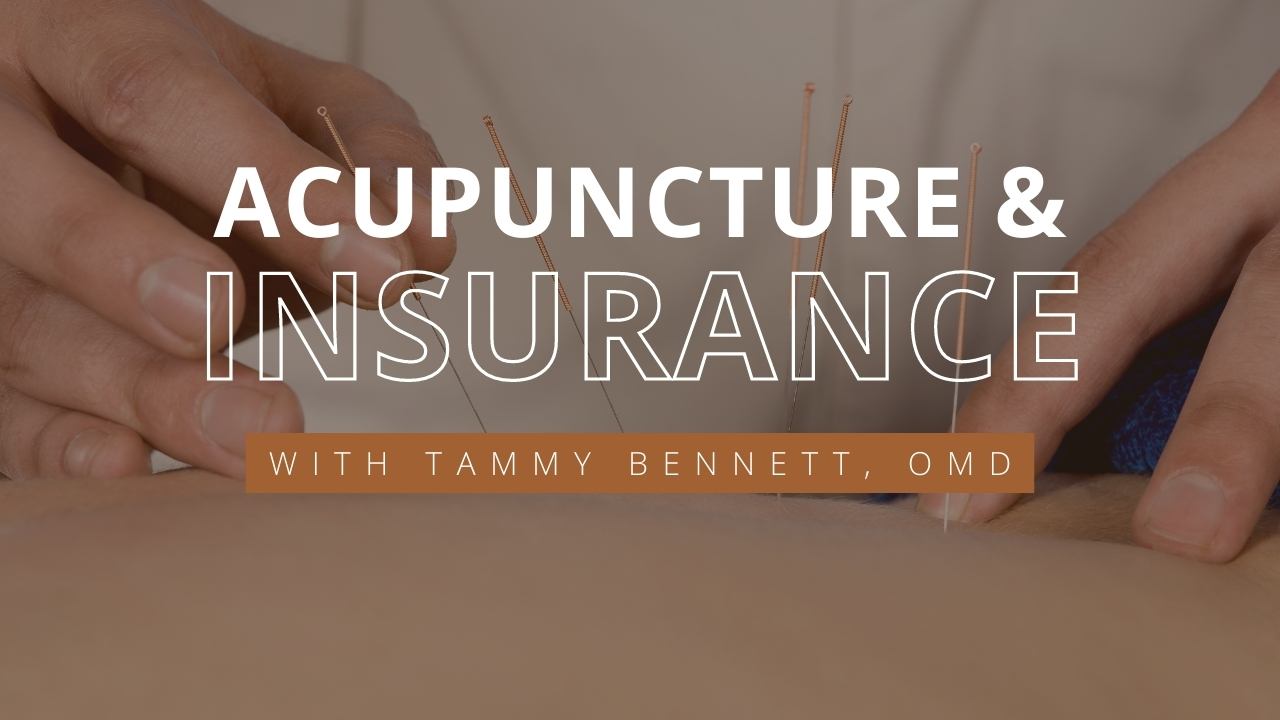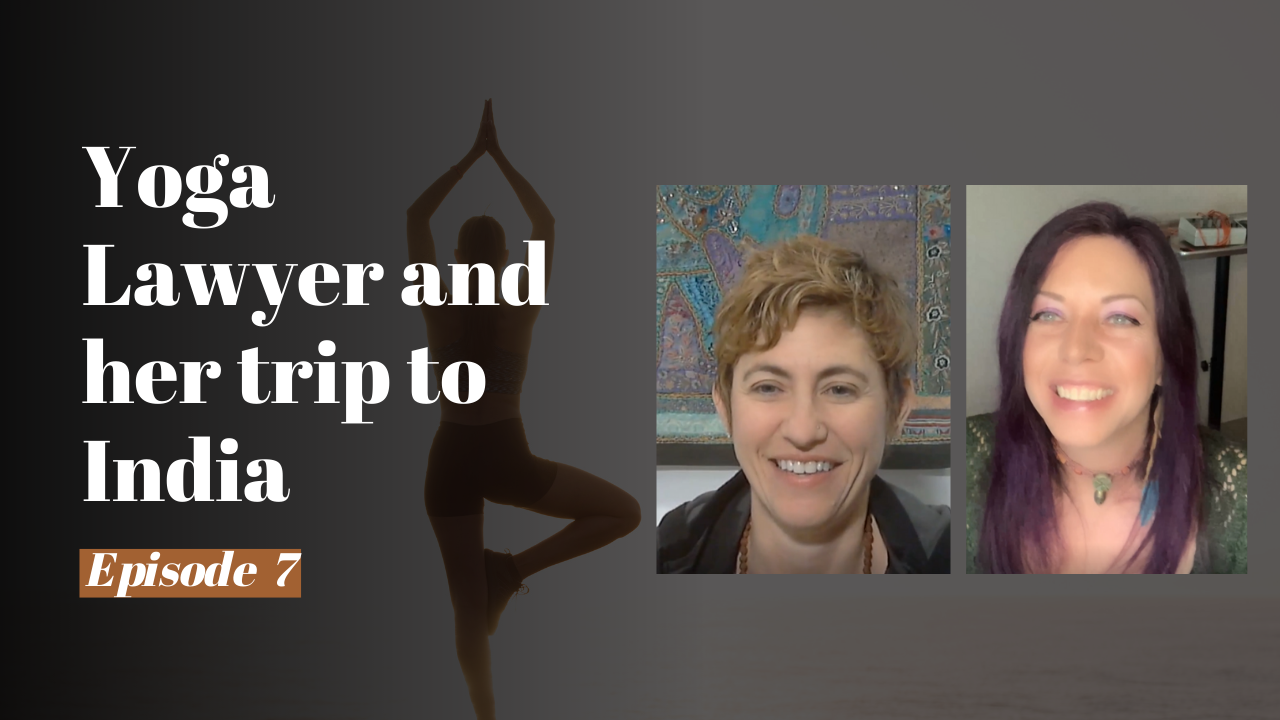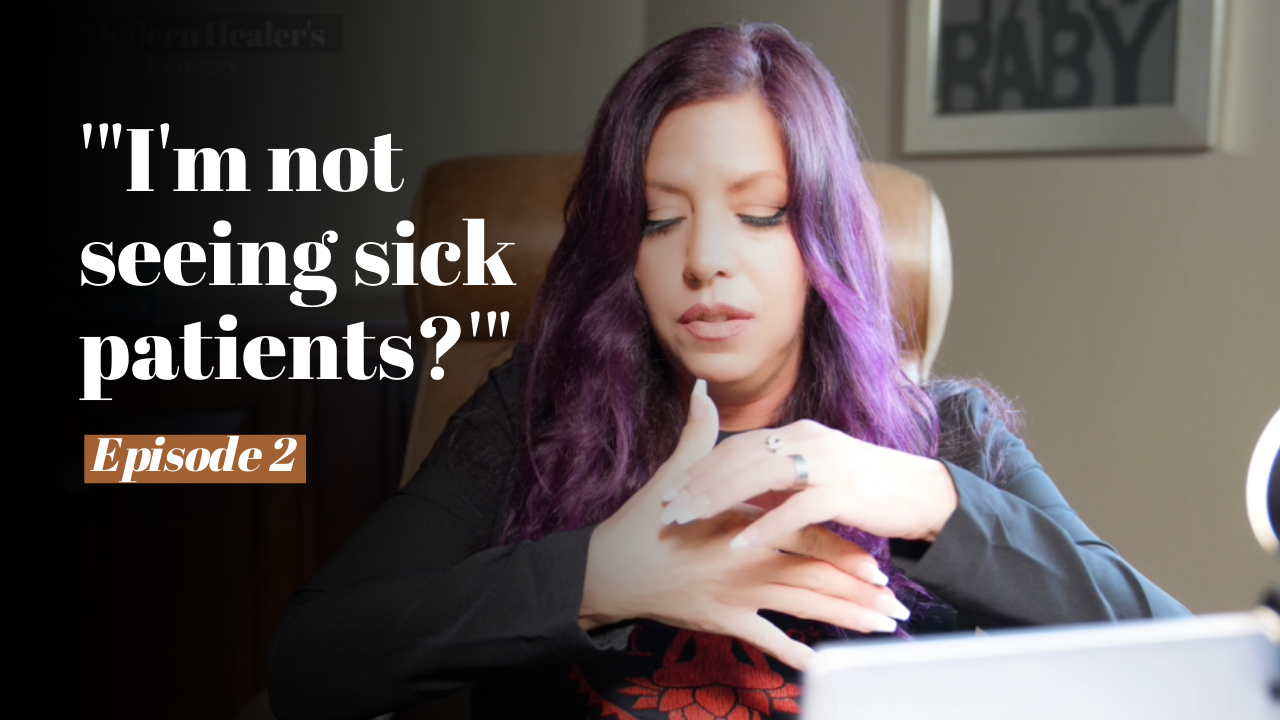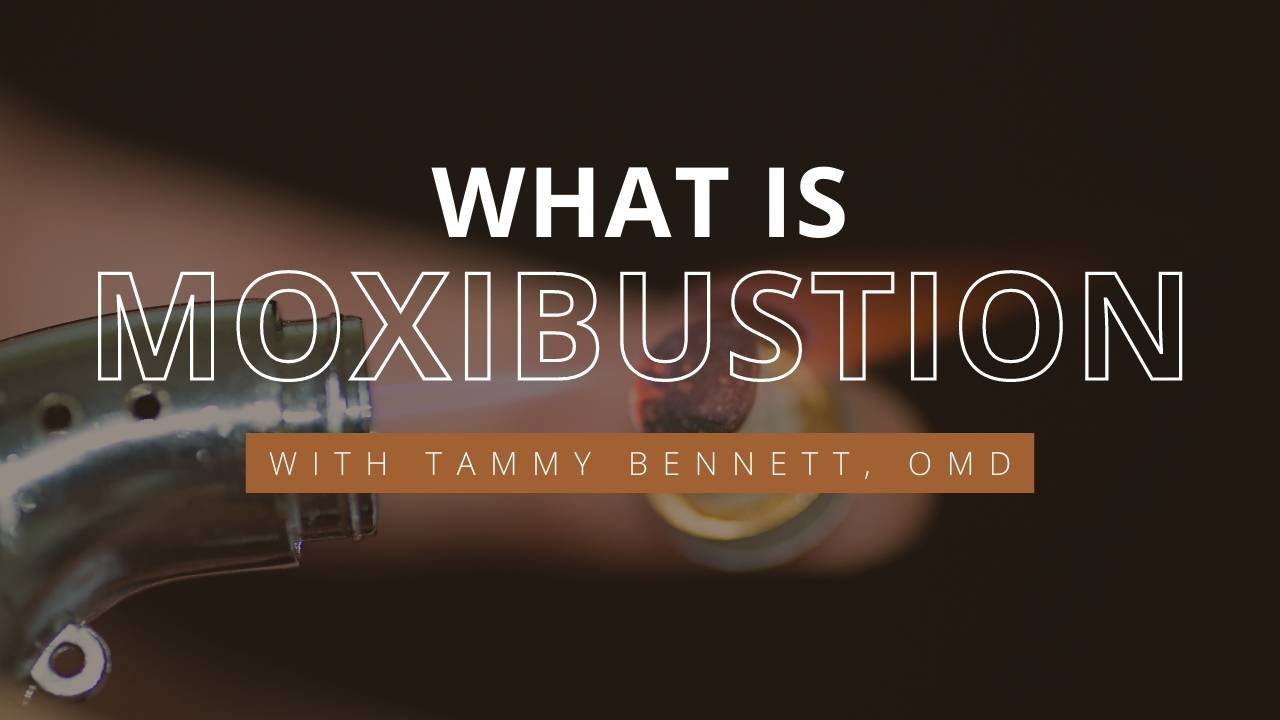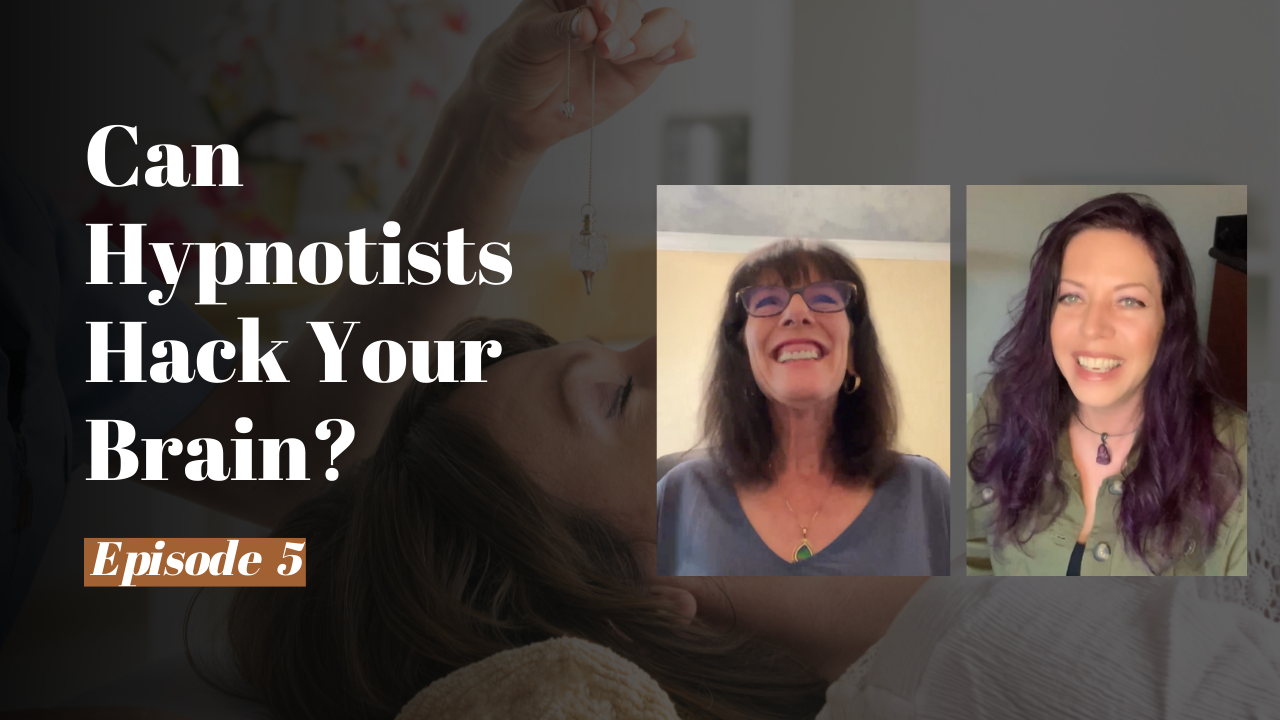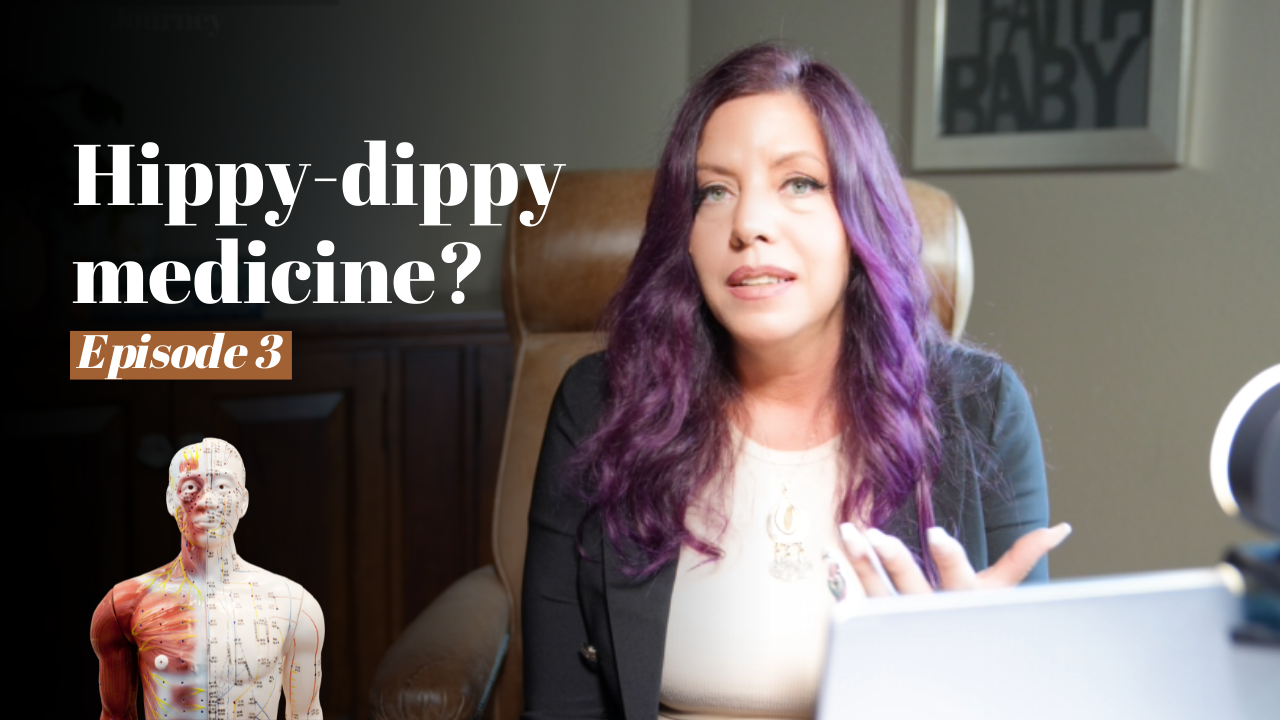Tammy talks to Dr. Carl D. Bilancione, a client of acupuncture, TV show Survivor Africa contestant in 2010, and Doctor of Dentistry. He will be speaking with Tammy Bennett, Doctor of Oriental Medicine, about how they met, how to survive in Africa, and myths about Dentistry.
Transcript
00:00:00:04 - 00:00:23:14 Speaker 1 I'd like to welcome everybody back to my YouTube channel. This is called A Modern Hero's Journey. I'm Tim Bennett, and I'm pleased to have my friend and colleague Robin Kunkel here on the line with me. And we're going to talk today a little bit about how we met, how acupuncture has worked for her. I'll maybe bust a few myths about acupuncture along the way. 00:00:23:21 - 00:00:50:18 Speaker 1 We'll talk about Robbins career as a chiropractor and her subsequent careers hypnotherapist. A little bit about something that's personal for me regarding hypnotherapy and take you on that journey and maybe do a deep dove in the future about some of these topics as well. Welcome, Robin. Thanks for coming on. 00:00:51:07 - 00:00:53:16 Speaker 2 Oh, thank you for having me. I'm excited. 00:00:53:16 - 00:01:01:22 Speaker 1 Absolutely. It's a beautiful Saturday morning. I actually my eyeline is looking out at a beautiful tree lined area. So we're lucky to have some good weather today. 00:01:02:12 - 00:01:06:05 Speaker 2 We're lucky to live in Florida generally. So it's great. True. 00:01:06:20 - 00:01:19:00 Speaker 1 True. So tell the viewers on the show how we actually met and a little bit about your history in chiropractic and hypnotherapy. And then we can kind of get into a little deeper conversation about those things. 00:01:19:18 - 00:01:45:02 Speaker 2 Okay. So Tammy and I actually met at a business networking group and I had a recently started my hypnotherapy business. And Tammy, of course, is the acupuncturist extraordinaire, if that's. So I actually have a question. Should we say acupuncturist or doctor of acupuncture? I always say acupuncturist. 00:01:45:10 - 00:02:18:15 Speaker 1 That's actually an excellent, excellent question for the audience. So technically, in the state statute, in the state of Florida for 57 is what covers my practice. It allows me to use several different titles behind my name, not in front. That's reserved for Dr. Wright, for an M.D. or a DIO or Doctor of chiropractic. So with acupuncture behind the name, it's either LLC, which is licensed acupuncturist or Deone, which is Doctor of Oriental Medicine, or OMD, which is Oriental Medicine Doctor. 00:02:18:23 - 00:02:43:05 Speaker 1 I chose Oriental Medicine Doctor just for my own advertising purposes, because Lacey seemed to be more like a certification versus the three and a half four years of education required to graduate in the state. So I use Oriental medicine, doctor, but when someone says, Hey, this is Tammy Bennett, Oriental Medicine Doctor, it doesn't really roll off the tongue. 00:02:43:06 - 00:02:52:08 Speaker 1 So I go by Tammy. I ask my patients just to call me by my first name, but I am an acupuncturist doctor of Oriental Medicine. 00:02:53:16 - 00:03:29:05 Speaker 2 Right? When I refer to you to other people, I say Dr. Bennett. But as I get to know you, of course, and you would say Tammy, so thank you for that. So we met at this business network group and you are always also looking for other products that can help people, that can supplement in their health. And so you were actually there in that group for that and not necessarily promoting yourself as a acupuncture doctor. 00:03:30:05 - 00:04:00:02 Speaker 2 And it took me a little while before I came in, not because of any hesitancy, just because I didn't feel I needed it at that point. And I hadn't actually studied in my chiropractic practice, only 100 hours of acupuncture, certainly not enough to be called an acupuncturist or anything like that. But so I had a general idea what acupuncture was and we would meet for lunch and talk. 00:04:00:02 - 00:04:39:22 Speaker 2 And you were always so into people's health and what could you do to help them and how could you support them? So the more I met with you, the more I really liked you. And eventually I did come in because I have an ongoing GI issue that you have been helping me with. GI is gastrointestinal, so reflux, stomach pain, things like that, as well as a chronic neck and mid back condition, which you have also helped me with. 00:04:40:03 - 00:04:47:03 Speaker 2 So that's how I came into you. What else do you want to know about that? 00:04:47:19 - 00:05:10:01 Speaker 1 Well, I guess I'm curious about the back itself, because originally when I first met with, you know, we had that lunch date, we talked about the fact that you exited chiropractic because of the pain that you were in, which to me, if I exited my acupuncture career, it would be significant that that injury or that condition would be severe enough that would take me away from my income. 00:05:10:10 - 00:05:18:01 Speaker 1 So was it an injury initially for the audience or was it a chronic musculoskeletal condition that took you out? 00:05:18:11 - 00:05:46:15 Speaker 2 It was probably the only time I remember injuring myself while I was in practice, believe it or not, was sort of in the beginning, and I was all lying of all things. And I remember pulling my neck and upper back, but it was early on in the practice and it didn't stop me from that. And earlier in my life I have had more car accident as a passenger when I was like nine or ten. 00:05:46:21 - 00:06:14:10 Speaker 2 And then when I was in chiropractic school, I also had a car accident where someone just cut out in front of me. And the reason those things can show up later on is I'm going to backtrack. I'll get to why that that could be. So I was in practice. I opened my chiropractic practice in January of 89 and I wound up having to sell it in 98. 00:06:15:00 - 00:06:48:15 Speaker 2 And over the years, my neck and my upper back, occasionally my mid back, my mid back is more of a thing now, I think more related to my gastrointestinal issues, but it would get worse and worse and worse. So think about people, you know, carpal tunnel syndrome and they will talk about that being a repetitive stress kind of injury, you know, from overuse, the repetitive use of your wrists. 00:06:49:06 - 00:07:13:21 Speaker 2 And I think that is what actually happened to my neck. I did have a really busy chiropractic practice and I was a manual adjuster for the most part. I liked getting in there and using my hands and I would also do trigger point work and then my flexion distraction work, which is where the bottom part of the table will be going up and down. 00:07:13:21 - 00:07:46:20 Speaker 2 But I would add there are tables that do that automatically, but I had one where I would push down and so I was very, very hands on. I had a very busy practice and I think for over the years it's started to create problems so that when I left I had a number of issues. I had cervical and thoracic plexus problems which are scar tissue in the area of the lower neck in the upper back. 00:07:48:13 - 00:08:10:15 Speaker 2 I would not be able to feel my hand by the end of the day. I would have incredible headaches that I hadn't had since I discovered chiropractic and actually saw a chiropractor. Although I grew up with headaches, I had such weakness in my right arm by the end of the day and it was getting worse and worse and worse. 00:08:10:15 - 00:08:40:03 Speaker 2 And I loved what I did. I loved chiropractic. Chiropractic. I got to see true miracles in my practice and I miss that. I miss that. But the thing that actually pushed me to sell was my son was an infant and it was the end of the day. And I went to carry him and I almost dropped him because my right arm had gotten so weak and I was in so much pain. 00:08:40:12 - 00:09:24:17 Speaker 2 And I realized that the condition wasn't getting any better. It was only getting worse. Even though I had you know, I'd seen my friends for treatments, for adjustments and doing stretches and all that. But the condition itself was getting more. So that was what motivated me to sell was really couldn't drop my baby. And also I needed to be try and think of the words, but I needed to be healthy, to take care of my family, to take care of myself and I know people who run themselves into the ground, but it doesn't help anyone in the end. 00:09:25:09 - 00:09:26:13 Speaker 2 So that was. 00:09:26:14 - 00:09:30:04 Speaker 1 What you had to practice for roughly almost ten years? 00:09:30:04 - 00:09:30:22 Speaker 2 Almost, yeah. 00:09:31:22 - 00:10:00:21 Speaker 1 Okay. And so we can look back and say repetitive motion was probably the worst part of it for you. Possibly some carryover from the old auto accident and scar tissue developed over time. So what did you do in the period where you ended the chiropractic career? I know you raised two children. And did you seek medical attention or other attention with different treatment modalities during that period of time until you found hypnotherapy? 00:10:00:21 - 00:10:01:15 Speaker 1 What was that like? 00:10:01:23 - 00:10:37:06 Speaker 2 Well, actually, hypnotherapy I never did for my neck. So what happened was when I sold the practice, I was not in great shape and I was always going for chiropractic. I really tried to avoid drugs. So I can't say I never take medication, but I really try to avoid drugs. There was no surgery. I had been to neurologists I had been to and surgeries last, by the way, it was we always said chiropractic first, drug second, surgery last. 00:10:37:06 - 00:10:38:04 Speaker 2 But there are. 00:10:38:05 - 00:10:39:12 Speaker 1 No acupuncture there. 00:10:39:15 - 00:11:10:06 Speaker 2 Sorry, it wasn't part of the statement, but acupuncture for sure. I mean, I would send my patients I didn't know you then, but I would send my patients for other alternative modalities and at other times to the medical profession. You know, when someone comes in to a chiropractor, you need to really evaluate whether they are chiropractic patient or if they're not, what could they be? 00:11:10:19 - 00:11:41:22 Speaker 2 Acupuncture. But beyond that, medical. So as an example, one of my earliest patients that I sent out and I remember this because they were really angry at me, was they came in with lower back pain and I always insisted on taking x rays. It was one of the things that we were taught to do. When I was in school, and I know that there's a lot of pop up places around right now where you could just walk in and they're not X-raying you. 00:11:42:07 - 00:12:04:03 Speaker 2 And you know what for at least 80% of the population, that'll be okay. They're not going to get injured. But I can get two times and I'm sure there were more. But the two that are in my head right now is this first one where this man got very upset with me. He had been to chiropractors his whole life. 00:12:04:03 - 00:12:43:23 Speaker 2 He was older and he just wanted to come in and get adjusted. And he did not even mind that I needed the X-rays. He understood that. But when I looked at his lumbar or lower back X-rays, he had an aortic aneurysm. So had I adjusted. Oh, and he also had something called this fondle LSC CIS, which is a really big word, which pretty much means that the less lumbar or lower back for excuse me vertebra was sliding on top of the sacrum and it's not like sliding back and forth, but because there's ligaments and scaffolding and then, you know, the bones in. 00:12:43:23 - 00:13:06:09 Speaker 2 But one of the treatments for respond to low is to have somebody lay on their back and you're actually pushing into it will have I done that I could have burst his aortic aneurysm. So I sent him out and actually it was a surgical emergency. He had surgery within a couple of days and aortic aneurysms can cause a little back pain. 00:13:06:16 - 00:13:14:05 Speaker 2 So that was but initially he was very angry that I wouldn't adjust him and. 00:13:14:08 - 00:13:16:07 Speaker 1 I understood completely. Yeah. 00:13:16:07 - 00:13:44:05 Speaker 2 The second time was this real sweet woman and and she was coming in complaining of pain up here. And, you know, nobody presents like the books tell you when you're in school. But this lady actually did with something called a pancreas tumor, which is from lung cancer. And so usually it's a smoker and there's withering away of the muscles up in this shoulder area. 00:13:44:10 - 00:14:09:12 Speaker 2 And she had that. But what was interesting is she had been to three medical doctors first and nobody took X-rays and no one looked at her. And I think that one of the reasons I was so busy was that when people came in, I would listen to them. And you look at the areas that hurt them, you touch them, you look at them, and then chiropractic, it could be a little different. 00:14:09:12 - 00:14:31:17 Speaker 2 They can have, let's say, elbow pain that could be coming from their neck. But you start by touching their elbow and letting people know that you heard what their symptoms are. And then you take a look at the whole patient. But her X-rays showed that whole upper area eaten away by this cancer. Oh, and I just thought of it there. 00:14:31:21 - 00:14:40:13 Speaker 2 I had a number of patients like that. We don't need to go into all of them. But I'm sorry. When I talk, I'm like I go up on the engines. 00:14:40:13 - 00:15:09:22 Speaker 1 So I see how passionate you are about people. And that's one of the things that the characteristics that we share, I think that's why we became friends through that organization was more outside of trying to get each other's business. It was more about compassionate care. And I think sometimes in the system that we have now and maybe you should come back on the show and talk about this, the system now as it's grown since I started in practice, I started in 98, which is when you sold your practical skills. 00:15:09:22 - 00:15:54:02 Speaker 1 It it was a different world. I mean, like the advent of those computerized notes system and the way that the insurance is driven, that the industries, all industries, right. With within ballistic and traditional medicine, it's become this other thing and it takes up the time away from the patient. So I want to fast forward to something. The reason that I got to be interested in you on the hypnotherapy side was that not only myself, but some of my patients were suffering with situations that although I have some tools in my kit to to help people with mental, spiritual, emotional, you take it to this other level in hypnotherapy. 00:15:54:02 - 00:16:16:22 Speaker 1 And I was really struggling with some issues, mostly dealing with like my grandparents and some things related to I had had three dogs in a row that my fur babies that had gotten sick, they were much older. I had never had old dogs before. I all my dogs lived to be 17, 18 years old. So my brain wasn't thinking about how to take care of an elderly dog. 00:16:16:22 - 00:16:35:16 Speaker 1 I thought they would just live forever. And then one night they would be on their pillow and go to sleep and go over the Rainbow Bridge. And there we go. And it was not like that. And I was traumatized and it was my work was suffering terribly as a result. It just I felt so sad and so guilty and all that. 00:16:35:16 - 00:16:45:04 Speaker 1 So I bring it to you to talk about what was the skip up into hypnotherapy for you? Where did it come from? How did that passion get started for you? 00:16:45:21 - 00:17:10:20 Speaker 2 So that's interesting. You had asked me, well, what did I do in all these years, you know, between selling the business and and just a little snippet of that. So my son is on the autism spectrum, so I wound up spending hours and hours and hours a week in the car. This is not why I sold the business. 00:17:11:01 - 00:17:36:20 Speaker 2 He had no diagnosis when I sold, but a year or so later, you know, give or take, he had this diagnosis and I always knew something was different. But, you know, doctors blow you off. And I even called the insurance company and I explain them and they go, Oh, you just need parenting classes. And I was like, Well, that might be true, but that's not what's going on. 00:17:37:08 - 00:17:59:17 Speaker 2 And so over in the beginning years, it was only three times a week speech, three times a week played therapy three times a week. I had my daughter in the mean time and we did a lot of this. I lived out in East Orlando at the time and the only preschool that would take my son in at the time was the Jewish community center there. 00:17:59:17 - 00:18:27:00 Speaker 2 Like, let's see if we can meet his needs. So I drove from East Orlando to Maitland and twice a day because it was a five hour program and what was I going to do for 5 hours? And I eventually wound up moving actually to Maitland because Maitland is a lot more central point than East Orlando and getting to various help, you know, not he never had to speech therapy schools. 00:18:27:17 - 00:19:05:14 Speaker 2 So I had that. And then when my daughter was eight she was diagnosed with Crohn's. And so then there were just different things we needed to do. And also with my son there was a lot of home program stuff to do, whether it was brain gym and homework and things like that. So when my son was graduating high school because my kids are in their twenties now, my son was graduating high school, my daughter was in high school and I realized I don't do that stuff anymore. 00:19:05:20 - 00:19:31:15 Speaker 2 All that driving was done, all that taking to doctors was done. So what was I going to do? And so I started investigating various jobs, if you would, and what would have to go back to school for. And nothing really got me passionate, like how I got into chiropractic for another day, but it was like passion. It was like I knew that's what I was supposed to do. 00:19:31:23 - 00:20:07:03 Speaker 2 And I was finding that pretty much anywhere. And then I also do a lot of I'm going to call it self help. There's probably a better term for it, but spiritual journey kind of things. And I had actually done a program, an online program with somebody named Marissa Pier, who is a British hypnotherapist. And there are things I like about her stuff and things I don't now in retrospect, like about it. 00:20:07:11 - 00:20:29:02 Speaker 2 But I was like, Wow, that's something I could do that could help people again, that one. Going back to what you talked about, about caring and compassion, and I was always wanting to look to do something that could help somebody and not just cover up. The problem that's part of the issue with our traditional system is most of the time it just covers up the problem. 00:20:29:10 - 00:20:39:00 Speaker 2 And even traditional psychotherapy takes years and years and years and years. And more often than not. 00:20:39:08 - 00:20:40:08 Speaker 1 It's a lot, a. 00:20:40:08 - 00:21:07:00 Speaker 2 Lot of money, a lot, a lot of time and doesn't always get to the root problem because the root problem, as we find out in hypnotherapy, is in the subconscious mind the stuff that's buried underneath. So once I discovered what hypnotherapy was and so I started researching, then I got really excited about it and that was my segway into it. 00:21:07:00 - 00:21:44:00 Speaker 2 And I actually took Marissa Piers online course. And then in the process of that, I discovered the school. I eventually got. What's an accredited degree from so Marissa peers online think of it more of this certification and you can practice by the way in any state in the country, you can practice hypnotherapy without an accredited program. But I learned so much in my accredited program and I'm very grateful that I did that and then I got to see miracles again. 00:21:44:00 - 00:21:45:11 Speaker 2 So that was exciting. 00:21:46:04 - 00:22:14:07 Speaker 1 So I want to speak to that miracle. So one of the things that I was dealing with myself was this tremendous amount of sadness, and it was like I always use the the the old saying, like a wet blanket. It's what it felt like just walking around heavy all the time. And I remember coming into my first session with you, and I remember you saying to me, which I thought was astonishing, planned for three or 4 hours. 00:22:14:07 - 00:22:31:16 Speaker 1 I was like, What I don't do 3 hours of 4 hours of anything. It was like, okay. So in my head I was like, Well, she's just giving me buffer time. Like, she's going to get to know me. And and you were gracious to say, you know, really what we're going to go to, we keep going until it's done. 00:22:32:08 - 00:22:56:08 Speaker 1 Like I expect you to come here once or twice, not every week for six months, which was interesting to me. And I remember coming into your office and I remember the big fluffy pillow. That was my favorite pillow. Fluffy. You had me in the chair. The chair was awesome. Rarely sit down. I'm always running around and I remember getting super comfortable and you telling me we were going to do this breathing exercise this. 00:22:56:19 - 00:23:21:23 Speaker 1 And I remember doing that in and out breathing and you coaching me. And then I remember it was like being under anesthesia when the doctor says to count backwards from 100 199, you didn't have me count but in my head and floating away as I'm breathing. But I feel the fluffy pillow. It was the weirdest in body out of body experience I've ever had. 00:23:21:23 - 00:23:44:07 Speaker 1 And I'm very much a type-A control freak kind of person. And it was controlled but out of control. So it was good for me. I knew you were there. You were the safety net. I wasn't like on a ayahuasca or trippy experience on drugs or ketamine or anything like that. But you were there. You were my tether. You were guiding me. 00:23:44:07 - 00:24:07:05 Speaker 1 We were I was talking to you, but having a conversation with my grandmother who passed away, all these things were happening simultaneously. And I remember because my dog was with me, my sister Clifford was in a little stroller there in the office. And I remember when we were done and I had tears streaming down my face, I even though like I knew I was crying, but I didn't know I was crying. 00:24:07:18 - 00:24:37:11 Speaker 1 And I kind of came out of it, you know, and you kind of looked at me and we both looked at the dog and he was just really paying attention like something had happened to him, to us. And I was exhausted when I left and I went home and I was like, whoa, like a big whoa moment. And I told my husband, Jeff, like, wow, like something happened. 00:24:38:04 - 00:25:00:17 Speaker 1 Something big happened. I don't know what's going to happen after that, but something happened and and, you know, days and weeks later, that blanket came off. And I could function like a normal person or what I thought was normal anyway in my life. And then I started to see a slew of patients do because like this, this is profound. 00:25:00:23 - 00:25:16:14 Speaker 1 This is bigger than big. So we're going to have to wrap the next 5 minutes. So I want to I want to bring it to you. You don't have to tell me exactly what you did, but the technique that you used, what was it supposed to do and what can you do for other people? 00:25:16:14 - 00:25:40:08 Speaker 2 So I never just use one technique in a session. So what you were describing was breathwork, so I can talk to that. But if I can just say one thing, people have this misconception in hypnotherapy that you are not in control and that you are totally under the control of the hypnotherapist. And that is. 00:25:40:18 - 00:25:42:11 Speaker 1 You're going to right. 00:25:42:16 - 00:26:09:23 Speaker 2 Off like a chicken. And and again, just time wise, we we can't go into that. But you described a perfectly hip in hypnosis. You're in an altered state, but you are always in control. So you can come out of it any time you want. You don't have to tell me anything. You don't want to tell me. You don't have to do anything but the patients. 00:26:09:23 - 00:26:37:03 Speaker 2 Well, I still see patients from when I was a chiropractor in hypnotherapy because we are not doctors as hypnotherapist, we'd say client but patient still comes out of my mouth just from being a chiropractor. But a client who gets the best results is the person who really wants it. And the person who's willing to look at whatever comes up and go with it. 00:26:38:02 - 00:27:09:23 Speaker 2 And you would think that people coming in really want to get taken care of ASAP, but some people need to go slowly and that's okay too. And those people, it's not going to be one or two visits and that's okay. Everyone does things at their own pace. So the techniques, to answer your question directly that we used was breathwork and Breathwork is a way to get past what we call the critical factor. 00:27:10:03 - 00:27:38:14 Speaker 2 The critical factor is that gate between your conscious mind and your subconscious, and you have to pass it. You have to get past it to get into the subconscious, to get into the things that happened when you were one, two, three, four or five two. Because most things that are affecting people now, they think it's because they don't like their job or they think it's because, you know, of all the turmoil that's going on. 00:27:38:14 - 00:28:22:15 Speaker 2 But it really brings it's other things, beliefs that we have about ourselves and the world that we formed years and years and years ago. So breathwork is phenomenally effective. I do want to say that it's really important to have a guide when you do Breathwork I know that there are group breathwork sessions that are done. It's not just done by hypnotherapist and it's they might call them rebirth thing and but it can bring up some very, very powerful and emotional things that have happened. 00:28:22:15 - 00:28:37:11 Speaker 2 And so if you do breathwork without a guide, sometimes you're left in this incredibly strong emotional state and you need someone to guide you, I think. All right. In my opinion. 00:28:37:23 - 00:28:38:16 Speaker 1 You got it close. 00:28:38:17 - 00:29:08:04 Speaker 2 Sorry. Yep, yep. Good process. What's come up to? You need to. Why am I having this and how do I process this? Because if you're buying one, whatever is happening happened and you don't have someone help you process it, then you lead the same way you came in. But if you can take a look at those memories that come up in those emotions that come up and process it and realize, okay, well, you're not five. 00:29:08:04 - 00:29:30:00 Speaker 2 And this is the decision that the five year old made, but what is the 40 year old going to make and what do you need to do to nurture? Nurture that inner child, that five year old who had this because that five year old still there. And I always talk about your imaginary mom or dad or Greg who's still there. 00:29:30:00 - 00:29:55:20 Speaker 2 Even if they've passed away, you're still hearing them. So we have to process all that stuff that came up. So doing breath work on your own may not be the best idea, but there are other techniques that people can do that if you ever wanted to. And we do an episode on just some of the neuro linguistic programing stuff that I would also use. 00:29:56:07 - 00:29:58:12 Speaker 1 NLP Yeah, and. 00:29:58:23 - 00:30:12:10 Speaker 2 There are things that people can do to even if it doesn't 100% address the issue, to at least help them through the emotion that they're feeling at that time. 00:30:13:03 - 00:30:48:00 Speaker 1 Got it. So I'm against the clock a little bit, but I want to I want to end with the fact that you made such a difference in so many people's lives. It it was really remarkable. I mean, I've been doing acupuncture and working with holistic people for a very long time, you know, over 25 years. Just recently attended a conference for the Florida State Oriental Medical Association, saw a bunch of colleagues that I've known for many years, people that talked about new techniques and ideas on holistic healing and spirituality and keeping healthy. 00:30:48:00 - 00:31:20:09 Speaker 1 And I have to say, of all the people that I saw there, I kept thinking about you and the effect that you had on, you know, a good number of my clients. So I really wanted to thank you for that and for helping me and for helping my husband, Jeff. And I really look forward to learning more and deeper diving this for other people because I feel like hypnotherapy has gotten a bad rap in the world and I want to talk about it in all of its science and the background and what people miss, what they gloss over. 00:31:21:03 - 00:31:32:16 Speaker 1 And again, I had had hypnotherapy experiences throughout my entire life, but not like that. So I thank you and I welcome you to come back when we have a longer podcast time. 00:31:32:18 - 00:31:47:18 Speaker 2 And thank you, I have to say thank you. You did send me a lot of clients and I remember every single one of them and they're all dear to me. And your trust in me is not taken lightly. Thank you. 00:31:49:01 - 00:31:55:15 Speaker 1 Thank you.

